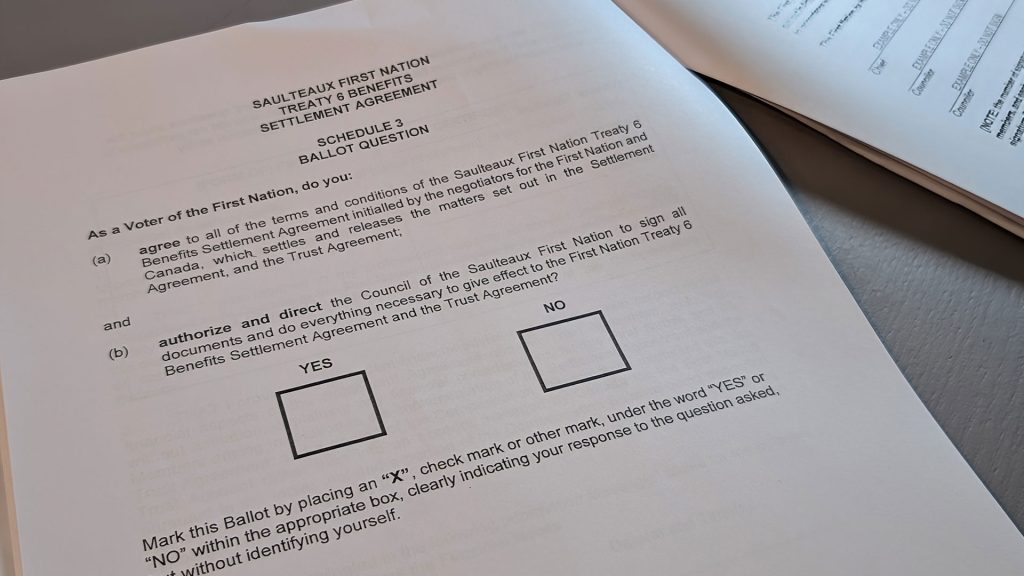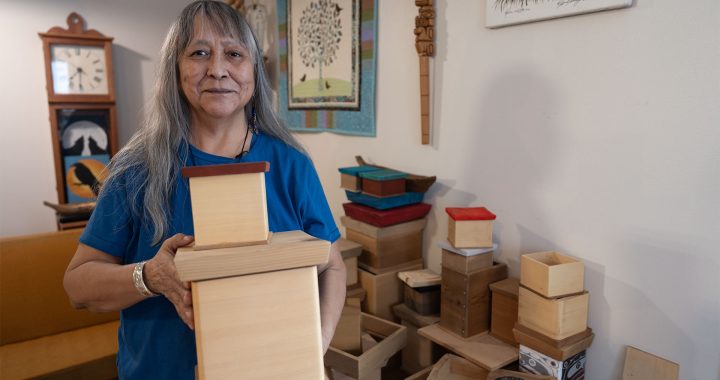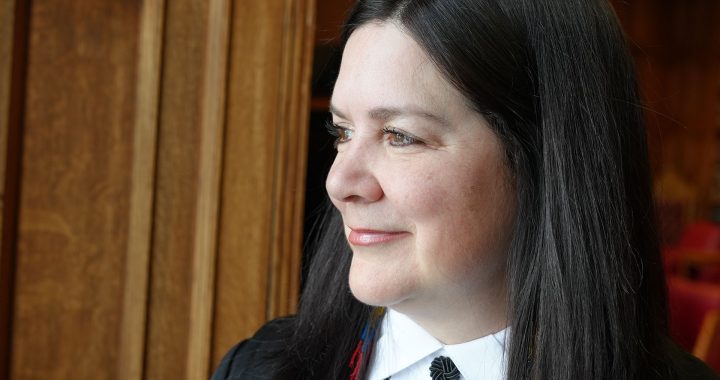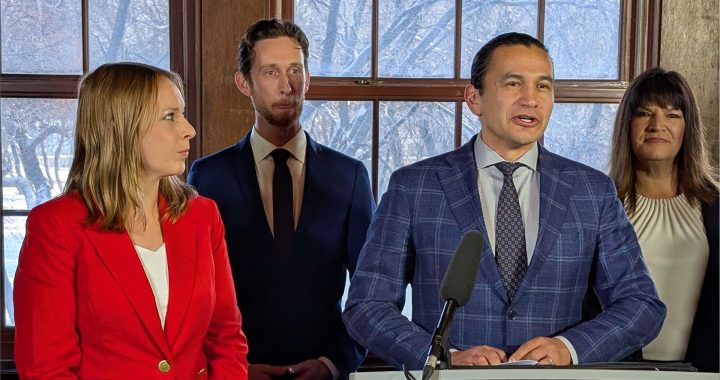
Cows and Plows Ballot
Some band members in Saulteaux First Nation staged a peaceful protest Wednesday to call out the chief and council on how they’re handling the ratification of its $81.8 million so-called “cows and plows” agricultural benefits settlement with Ottawa.
Noella Moccasin told APTN News she’s made several complaints about the band northwest of Saskatoon to Indigenous Services Canada [ISC].
Moccasin said she and other band members are concerned that the trust agreement that governs how the money is managed will give the chief and council jurisdiction over the remainder of the settlement once members are paid their portion.
“People have been calling from the reserve. I had left a message with them, three times, starting when we had our election act passed. A lot of people are not happy with how things are being handled,” Moccasin said.
Saulteaux has a membership of 1,029. Moccasin said based on the amount of the settlement, each of the members should receive around $54,000 but the Per Capita Distribution (PCD) payment to each member is set at $28,000 under the agreement, with the remainder being held in a trust.
APTN spoke to Saulteaux’s director of administration, Alexis Christensen, who said the amount was determined during complex negotiations with Canada on the settlement for Saulteaux.
“Canada took the historical promise, used inflation to bring it to date, that includes current members, but also future members. We kind of look at it as a third, a third, and a third. There was a recommendation from our legal team and accountant that it not exceed $20,000 but chief and council deliberated over several meetings about it and arrived at $28,000,” Christensen said.
Christensen said as part of chief and council’s due diligence, they attended many information sessions.
Canada required informational meetings for band members as part of the ratification process for the Cows and Plows settlement. Christensen said three meetings were held in Regina, Saskatoon, Edmonton and Saulteaux.
She said the meetings were publicized through the band’s Facebook page.
“It’s a very complicated and complex process, so for members to come to a two-hour meeting and receive their information package, it’s a lot. If I was in their shoes, I would walk away with a lot of questions too,” Christensen said. “I think where people are misinformed is that Treaties are not an individual right, it’s a collective agreement.”
Moccasin said the ballot for the vote asks three questions including yes or no to the settlement and to a trust to hold funds for band members younger than 18. The younger members will receive their payouts when they turn 18, plus four per cent interest.
According to the information package provided to band members on the settlement agreement, the trust account, called the Sovereign Wealth Fund, will be made up of the settlement compensation and the band’s own revenues.
Ratification vote
The first question on the ratification ballot reads: “Agree to all of the terms and conditions of the Saulteaux First Nation Treaty 6 Benefits Settlement Agreement initialed by the negotiators for the First Nation and Canada, which settles and releases the matters set out in the Settlement Agreement, and the Trust Agreement.” Yes and No boxes are below the question.
The Trust agreement includes a clause that states “The First Nation and the Trustee acknowledge that the First Nation, acting through its duly elected Chief and Council, is the beneficiary of the Trust, with all the rights and powers normally vested in a beneficiary to compel enforcement of the Trustee’s duties under this Agreement.”
The Trust agreement also shows chief and council can borrow up to 60 per cent through authorized loans.
Christensen said all of the money [from the settlement] will go into the trust overseen by Royal Trust which will have to provide quarterly reports to the band membership.
“All of this has to be audited. Saulteaux presents a financial audit and the Trust will provide their audit every year and it’s a standard practice here in Saulteaux First Nation so there would be no way that people would be doing whatever with the money,” she said. “And even future councils wouldn’t be able to do whatever with the money.”
In an interview with APTN, band member Richard Wuttanee questioned how the first item on the ballot is worded and what it will do if members vote yes.
“We want a forensic audit done for the last how many years to prove if the monies-taxpayer’s dollars-are being accounted for dollar for dollar, and approved for within the budget.” Wuttanee said.
Advocacy group assisting band members
Some Saulteaux band members have turned to the Band Membership Alliance and Advocacy Association of Canada. The group helps find legal representation for band members with complaints against their chiefs and councils.
Founder Rob Louis said Saskatchewan appears to be “the Wild West” when it comes to band councils setting their own rules for settlement payouts.
“In the last year we have received a number of calls from Saskatchewan, it’s a hot spot right now because of the Cows and Plows settlements that are coming into communities. I received a call from Richard Wuttanee because of our work at Thunderchild First Nation,” Louis said.
Band members there filed two claims against the chief and council after a $155.4 million dollar settlement was announced in April. At that time, Crown-Indigenous Relations said the settlement came out of an “expedited resolution strategy” for agricultural benefit claims.
According to Louis, a notice of application was filed in April with band members asking chief and council to “unilaterally fix low per capita distribution [payments] to membership arising from the Treaty 6 Agricultural Benefits settlement funds.”
The cases are before the courts.
With the timing of Saulteaux’s ratification vote coming one month before Christmas, Louis said the chief and council are taking advantage of the community’s most vulnerable.
“A lot of First Nation’s band members live in poverty, whether it’s on-reserve or in urban areas. So, when chief and council are dangling $5,000 or $10,000 in front of them and saying ‘vote yes and you’ll get this right away,’ Louis said.
“But, a lot of them are entitled to a lot more than that. I just see that as a power imbalance that band councils are using to their advantage.”
Christensen doesn’t agree this will be a factor on how members vote, with Saulteaux band members not seeing the Cows and Plows settlement money until sometime next year.
A federal government release on Oct. 18 said Canada “is renewing relationships between the Crown and First Nations by addressing Canada’s failure to provide First Nations with the agricultural provisions promised under Treaties 5, 6, and 10” – also known as the Cows and Plows settlement. The release said Canada has provided $1.9 billion to First Nations in the western provinces since May 2023.
Through the Treaties, Canada promised plows, seeds for important crops, livestock such as cows and bulls, and other farming necessities.
The agricultural benefits were meant to help First Nations transition from traditional hunting and trapping for their livelihood to farming.
However, Canada said because of its “failure to fulfill Treaty promises, these First Nations did not have the equipment needed to support their members.”
Moccasin said band members deserve answers and transparency from the band. She says the band received $2.6 million in two previous settlements for land the band was owed.
“We were given $750 each, leaving, I believe, $1.9 million left over. There’s no account as to how that money was spent,” she said.
Christensen said the band will be giving members $500 each this year and the remainder is still in the bank.
Read More:
APTN Investigates: Cows and Plows in Treaty 8
Wuttunee said a new fire hall was one of the things promised by the administration with that money, but so far, only the site has been graded. Christensen said that project is still in the works and can’t be built overnight due to the tendering process.
“I believe we are at the point now where we will be looking to break ground. We’ve also negotiated with ISC at one point they were going to pay 50 per cent and we would come up with 50 per cent, so we do have that money available,” Christensen said.
“But, I believe that ISC is going to pay 100 per cent of the fire hall, and the nation is looking at adding on a mega-shop to house our assets for public works and stuff like that.”
A majority over 50 per cent is required from the ratification vote for the settlement to move forward. Money is expected to flow to the nation sometime next year, according to Christensen.
“They [Canada] have three months to sign off on the ratification. We’ve seen some of the other nations take up to six to nine months before the money actually flows,” Christensen said. “So, there’s still going to be conversations down the road whether we’ll be able to take a bridge loan.”
Christensen said interest on such a loan is quite high, but she said she can’t speak for what the chief and council will decide.
Editor’s Note: Amount of this year’s payment from previous settlement is $500, not $750.










